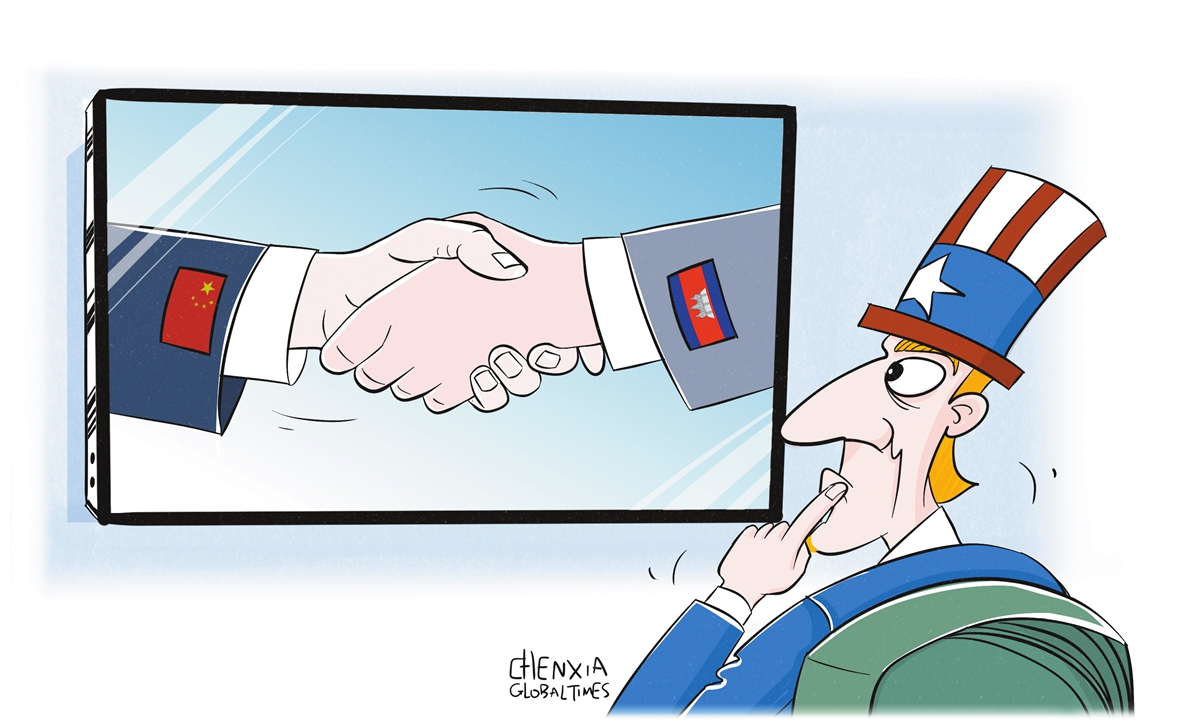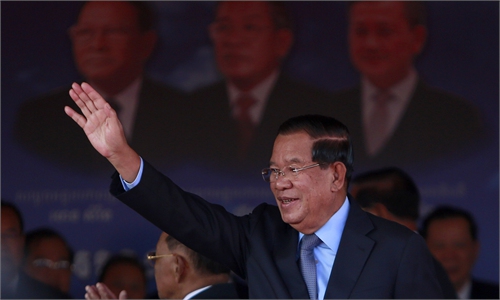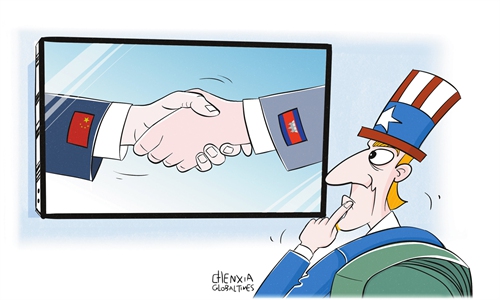Cambodia’s strong ties with China can withstand baseless speculations: Cambodian scholar

Illustration: Chen Xia/GT
It was reported that during a meeting between the US and Cambodia defense officials on February 24, the two sides discussed the enhancement of the bilateral defense relationship, including the possible resumption of the joint Angkor Sentinel military exercises, which was suspended by Cambodia in 2017. When reporting this, some media outlets didn't hesitate to make a correlation with relationship between Cambodia and China.This adds to a recent narrative surrounding Cambodia's foreign policy that speculates a potential recalibration, suggesting a pivot toward the US at the expense of its "ironclad friendship" with China.
However, such interpretations fundamentally misrepresent the robust and deeply rooted relationship between Cambodia and China, which remains anchored in mutual trust, economic collaboration and shared strategic interests. As Cambodia embarks on a new political chapter, its commitment to deepening its comprehensive strategic cooperative partnership with China remains unwavering, underpinned by a balanced and independent foreign policy.
Economic collaboration remains the cornerstone of their relationship. China is Cambodia's largest foreign investor, funding a multitude of infrastructure projects, industrial parks and special economic zones. The China-Cambodia Free Trade Agreement, which took effect in 2022, has significantly enhanced market access for Cambodian agricultural and manufactured goods, thereby bolstering bilateral trade.
In recent years, Cambodia's exports to China have witnessed substantial growth, demonstrating the tangible benefits of sustained economic engagement. Major projects such as the Phnom Penh-Sihanoukville Expressway, Siem Reap International Airport and various energy initiatives underscore China's long-term commitment to Cambodia's economic progress.
These investments not only drive national development but also generate employment and strengthen Cambodia's economic resilience.
Besides, Cambodia and China maintain robust defense and security ties. Joint military exercises, training programs and capacity-building initiatives reflect the strategic trust between the two nations.
China-Cambodia relations also extend to encompass cultural, educational and humanitarian cooperation.
Thousands of Cambodian students have benefited from Chinese scholarships, while cultural initiatives and language programs have strengthened interpersonal ties. China has also played a crucial role in the public health sector of Cambodia. The post-pandemic resurgence of Chinese tourists is also expected to further boost the tourism sector in the Southeast Asian country, a key driver of economic growth.
While Cambodia remains steadfast in its strategic partnership with China, it is equally committed to maintaining balanced and pragmatic diplomacy.
As a sovereign nation, Cambodia engages with a diverse range of international partners. This approach does not signify a shift away from China but reflects Cambodia's independent and diversified foreign policy. Cambodia adheres to an independent foreign policy based on national interests rather than external pressures. Cambodia's engagement with the US and other Western partners aims to foster trade, investment and diplomatic dialogue without compromising its strong ties with China.
Speculation about Cambodia distancing itself from China is baseless and ignores the historical depth and strategic significance of their partnership. China-Cambodia relations continue to thrive, underpinned by economic collaboration, strategic trust and cultural ties. As Cambodia navigates an evolving geopolitical landscape, it remains committed to an independent foreign policy that prioritizes national development and regional stability.
Rather than succumbing to misleading narratives, it is crucial to recognize Cambodia's diplomatic agency and the enduring nature of its friendship with China. The new era of China-Cambodia relations is not one of divergence but of reinforced commitment, ensuring mutual prosperity and strategic cooperation in the years ahead.
The author is the director general of the International Relations Institute of the Royal Academy of Cambodia. opinion@globaltimes.com.cn


